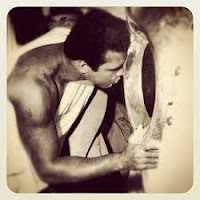 |
| With Nasser, 1964 |
When he announced his conversion to Islam, it was to the extremely unorthodox Nation of Islam, which many Muslims did not accept as Islamic. Later, in 1975, he converted to mainstream Sunni Islam. In 2005, he announced himself an adherent of the Universal Sufism movement led by Inayat Khan.
 |
| Praying at Hussein mosque, Cairo |
 |
| At the Kaaba |
He would make many other visits to the Middle East. He was decorated by heads of state from Morocco to the Gulf, He generally drew crowds wherever he went. In 1982, having retired from the ring, he held two exhibition fights in Abu Dhabi and Dubai.

In 1986 he visited Egypt for the second time, posing at the pyramids.
This is only a partial catalog of Ali's love affair with the Middle East, which was very much mutual.
 |
| Receiving a decoration from King Hasan II of Morocco |

Met Ali twice. In Benghazi in 1971 or 72 when I was Principal Officer there. Unsure how he stood with Washington, I did not tell them or the U.S. Charge in Tripoli that I was going to the airport to help the Foreign Ministry receive him for a brief stopover. He looked at me suspiciously when I introduced myself, but I said "Welcome to Libya, Champ," and he smiled. On Libyan TV he told young Libyans to educate themselves rather than entering the military. A diplomat's dream. The second time was in the State Department in the mid-1980s. Jesse Jackson had gotten Ali to agree to go with him to Damascus in an effort to free a U.S. prisoner. I briefed them on the state of U.S.-Syrian relations (as usual, not good). Ali's Parkinson's Disease was already having its effects. He said nothing until they got ready to leave when he said a faltering but sincere thanks. Muhammad Ali was a class act.
ReplyDelete